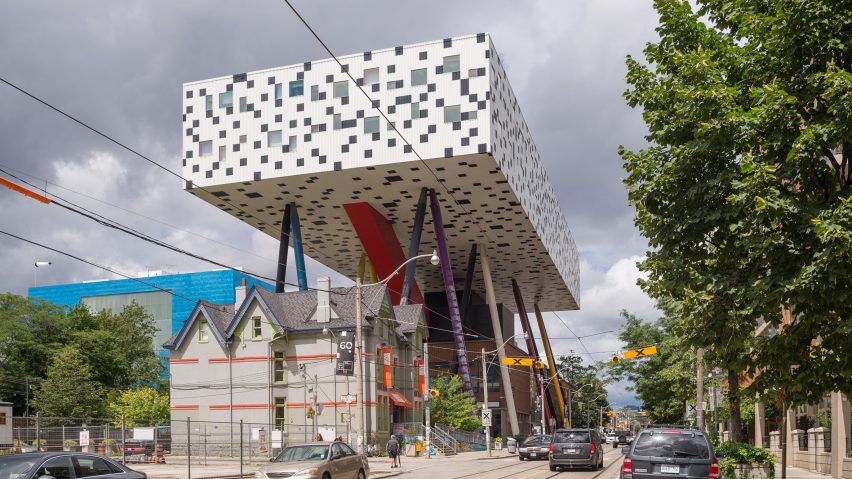
Architecture industry pays tribute to "true free spirit" Will Alsop
Emotional tributes have been pouring in for the late British architect Will Alsop, "a lover of prodding hornets nests", who died this weekend.
Alsop's son-in-law, the journalist Alexander Larman, was among the first to share fond memories of the architect, known for buildings including Peckham Library in London and the Sharp Centre for the Ontario College of Art & Design.
"He had a sense of vitality and bonhomie that infected everything he did," wrote Larman on his website.
"Nobody who has been to the Peckham Library, to the North Greenwich tube station, to the Sharp Centre for OCAD in Toronto or the Blizard Building at QMU – to name but a tiny handful of his buildings – could walk away without feeling a sense both of awe and amusement at the playful and inquisitive sensibility that they displayed," he said.
Peers, friends and critics have also paid their respects to Alsop on social media.
Architects Sam Jacobs and Charles Holland tweeted about the generosity of Alsop's support in the early days of their now-defunct practice FAT, which they ran with Sean Griffiths.
"Thank you Will Alsop for believing in FAT when no-one else did," wrote Jacobs.
Thank you Will Alsop for believing in FAT when no-one else did. Really one of the most (and maybe only) generous architects of the baby boomer generation. Here's CIAC, our building in Middlesbrough that was part of his masterplan pic.twitter.com/kvd3wavgfX
— Sam Jacob (@_SamJacob) May 13, 2018
Praise also came from RIBA president Ben Derbyshire, who called Alsop a "larger than life" character with "an indefatigable free spirit" in a tweet, while RIBA Journal editor Hugh Pearman likened Alsop to charismatic Motörhead frontman, the late Ian Fraser Kilmister.
"The Lemmy of architecture, we'll not forget you," he tweeted.
Kate Goodwin, head of architecture at the Royal Academy of Arts, described him as a "charismatic provocateur" and an "agitator" in a statement sent to Dezeen.
Also among those paying tribute on social media were the Guardian's critic Oliver Wainwright and former BD editor and Archiboo founder Amanda Baillieu, who lamented that Alsop's work was "never properly appreciated in the UK."
"Will Alsop dies and so does one of architecture’s biggest characters and talents," she said.
Will Alsop was one of the true free spirits and creative iconoclasts of contemporary architecture, with an exuberance that reached full flower in the Sharp Center at OCAD in Toronto. He never had enough opportunities to build — a sad loss for architecture. https://t.co/SuTvALJcBJ
— Paul Goldberger (@paulgoldberger) May 13, 2018
The sentiment was shared by architecture critic Paul Goldberger, who tweeted about the lack of support for the architect's work in the UK. In his later career, Alsop mainly built abroad, on projects including a pair of colourful metro stations in Toronto and his Gao Yang development in Shanghai.
"Will Alsop was one of the true free spirits and creative iconoclasts of contemporary architecture, with an exuberance that reached full flower in the Sharp Center at OCAD in Toronto" he said.
V&A museum curator Brendan Cormier and architecture critic Tom Dyckhoff also both praised the architect for his work on the Sharp Centre.
"Growing up in Toronto, it's impossible to underestimate the impact that Alsop's Sharp Centre for Design had on the local design culture," wrote Cormier in a comment on Dezeen. "It arrived like an alien, broke with cliches of a staid and conservative city, and changed how we thought cities could look like."
Dyckhoff wrote in a tweet: "RIP Will Alsop. A lovely fellow. A bloody great laugh. A lover of (metaphorically) prodding hornetsnests. And architect of the still excellent, unrepeatable Sharp Center, Toronto."
In an Instagram post, former colleague Stephen Pimbley of Spark Architects recalled his 16 years working with Alsop on projects including on the Hôtel du Département regional government headquarters in Marseilles.
"Will was the most creative architect of his generation unfortunately at a time when our industry became increasingly safe and commercial," wrote Pimbley. "Most of the great and the good came in for a lashing from his tongue at some point in time."
We have all been privately mourning Will Alsop. Today, the first day back in the office, we want to celebrate a life that has touched so many; remember the good times and share them, there are so many. Celebrate his life the way you feel you should, we will. @ALLDesign1 pic.twitter.com/jnwDJUBCbT
— Marcos Rosello (@marcos_rosello) May 14, 2018
All Design practice director Marcos Rosello has also paid tribute, asking those who knew the architect to "remember the good times and share them". In a post on Twitter, he confirmed that work has resumed at the studio.
Photograph of the Sharp Centre is by Arild Vågen.